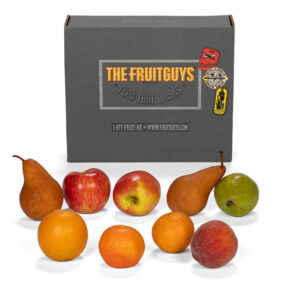Giving gifts to your employees is a win-win situation. They get the warm fuzzy feeling of being appreciated and you end up with a happier team, greater company loyalty and retention, and enhanced productivity. But what if we told you there’s a financial benefit to gifting, too?
In some circumstances, gifts to employees for holidays, work anniversaries, achievements, and other occasions are tax deductible. The Internal Revenue Service has different rules for different kinds of gifts. Here’s a quick guide to the rules and potential federal tax advantages of gift-giving for your business and team.

As a general rule, the IRS considers employee holiday gifts “de minimis benefits,” as long as those gifts aren’t too lavish. That means your employees don’t have to pay federal income taxes on their gifts, and you can deduct the value of those gifts as non-wage business expenses on your federal taxes. (There’s no hard spending cap, but in the past, the IRS has said that the value of de minimis benefits shouldn’t be more than $100.)
“If, to promote employee goodwill, you distribute merchandise of nominal value or other de minimis items to your employees at holidays, you can deduct the cost of these items as a non-wage business expense.” –The IRS

It’s important to note that this does not apply to gifts of cash or cash equivalents like gift cards and credit cards.
“In most cases, sending tangible gifts to employees is a smart choice for businesses,” says Joy Padilla, The FruitGuys’ accounting supervisor. “Cash or cash-equivalent gifts can be subject to income taxation. If you give a tangible gift instead, this can save your team from paying extra taxes.”
You can read more IRS guidelines for de minimis benefits here to check if your employee gifts are tax deductible.
All of the gifts in The FruitGuys’ gift line can meet those criteria, depending on the size you choose.* Check out our popular Fruit Lovers Gift ($27) or Snack Lovers Gift ($35) for holiday gift inspiration.
Gifts that taste good and do good, too

The IRS considers certain employee gifts “achievement awards,” and those gifts come with different tax rules. Generally speaking, employees don’t have to pay federal taxes on gifts worth up to $1,600 that are considered achievement awards. You can also deduct the cost of those gifts from your federal taxes as non-wage business expenses. In certain circumstances, the value of the achievement award might even be employment tax-free, but because these rules are complex, we recommend you speak to your accountant or a tax advisor.

It’s important to note that the “achievement award” label does not apply to gifts of cash, cash equivalents like gift cards and credit cards, vacations, meals, lodging, theater or sports tickets, or securities. Also, in order for the full $1,600 to be federal income tax-free and tax-deductible, you need to create what the IRS calls a “qualified plan” for your awards. You can read more about that here. Without a qualified plan, only awards worth $400 or less are income tax-free and tax-deductible.
Finally, you should familiarize yourself with when a gift counts as an achievement award. Achievement awards typically fall into two categories: length-of-service awards and safety achievement awards.
A length-of-service award is a gift given to an employee as a thank-you for their long-term commitment to the company they work for. Employees can only receive these awards after five years with the company. That means a fourth-anniversary gift wouldn’t count as a length-of-service award, but a fifth-anniversary gift would. Employees can only receive these awards at five-year intervals. If you forget to give one of your team members a fifth-anniversary gift and give them a sixth-anniversary gift instead, you can’t celebrate them with another large gift until their eleventh anniversary.
Certain employees are eligible for safety achievement awards, which must be focused on successes in the area of “safety.” For example, if an employee sets a company safety record or wins a drawing specifically for employees with perfect safety scores, that could potentially be grounds for a safety achievement award.

As you can see, the stipulations for this type of award are extremely complex! We recommend talking to your account or tax advisor before you make a purchase.
When you’re ready to buy, you can shop The FruitGuys’ gift line for all of your achievement award needs. As long as you pick the right person and occasion, our edible gift baskets should meet the IRS’s criteria and be federal income tax-free and tax-deductible.
Our gifts also fall below the $400 threshold, so you can secure the tax benefits of an achievement award regardless of whether you have a qualified plan.
Gifts that taste good and do good, too
Not sure where to start? Consider splurging on a large Fruit & Snacks Gift ($115) for those big employee milestones and achievements. It’s packed with an impressive array of unique and delicious products that will make even the most seasoned members of your team feel appreciated.
Like holiday gifts, employee gifts for birthdays and other infrequent occasions typically count as de minimis benefits and come with the same tax stipulations. For example, if an employee’s mother passed away and you sent a fresh fruit and snack box as a “thinking of you” gift during their bereavement leave, you could likely deduct the value of that gift as a non-wage business expense on your federal taxes.
 When you purchase gifts for your employees, you should also consider any state tax implications. You may find additional benefits! In California, for example, employee holiday gifts aren’t subject to the Employment Training Tax (ETT) or Personal Income Tax (PIT). Check your state’s official Department of Labor website, or an equivalent resource, for more information, or speak to your accountant or a local tax professional.
When you purchase gifts for your employees, you should also consider any state tax implications. You may find additional benefits! In California, for example, employee holiday gifts aren’t subject to the Employment Training Tax (ETT) or Personal Income Tax (PIT). Check your state’s official Department of Labor website, or an equivalent resource, for more information, or speak to your accountant or a local tax professional.
The more you know about the tax implications and professional benefits of giving holiday gifts, the more business-savvy it seems. When you’re ready to shop, our gift lineup is waiting for you.
Gifts that taste good and do good, too
*This article contains general information and should not be construed as professional tax, legal, or accounting advice. Consult your own accountant or tax advisor to determine the best approach for your situation.
This blog was originally published on Dec. 16, 2023, by Lex Flamm. It was updated by Lex Flamm on April 12, 2024.
"*" indicates required fields
Take advantage of faster checkouts and other great benefits.
Create an AccountWe are here to help you provide healthy food, meaning, and a reason to gather in your workplace.
From weekly mixed fruit for break rooms to monthly gifts for remote staff to special projects, we can serve your needs or turn your dreams into a nourishing reality.
Get your weekly dose of the latest fruit info and exclusive updates.
"*" indicates required fields

